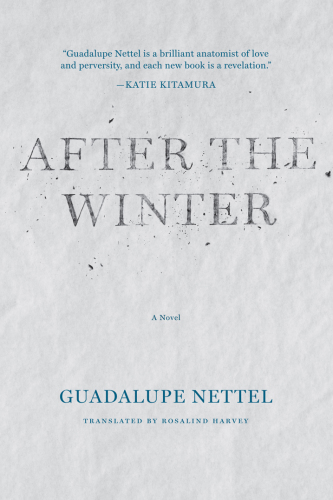
After the Winter
فرمت کتاب
ebook
تاریخ انتشار
2018
نویسنده
Rosalind Harveyناشر
Coffee House Pressشابک
9781566895330
کتاب های مرتبط
- اطلاعات
- نقد و بررسی
- دیدگاه کاربران
نقد و بررسی

Starred review from July 30, 2018
Tracing two lives on two continents, Nettel’s novel is an engrossing examination of what happens before and after a brief affair. In New York, misogynistic book editor Claudio, originally from Cuba, romances an older woman he doesn’t respect, and depends on a precise routine each day. Across the Atlantic, Cecilia settles in Paris, far from her home in Mexico, to work on a postgraduate degree, and starts a relationship with her ill bookseller neighbor, Tom, who is obsessed with cemeteries. Tom leaves for Sicily in hopes of spiritually confronting his disease, and while he’s away, Cecilia meets Claudio, who is traveling abroad with his lover, through a mutual friend. The pair strikes up a whirlwind romance that continues once Claudio returns to New York. Though this illicit relationship fizzles, the duo is uniquely changed by their time together—Cecilia amplifies her dedication to Tom; Claudio turns his attention to running marathons—and as Nettel (The Body Where I Was Born) chronicles Cecilia and Claudio’s return to normalcy, the impact of their fleeting romance ripples through their relationships and decisions. Nettel’s sharp, potent novel depicts how even the briefest relationship can affect the rest of a life.

August 1, 2018
Mexican author Nettel's (The Body Where I Was Born, 2015, etc.) third novel tells the intersecting stories of a man and a woman living, respectively, in New York City and Paris.Misanthropic, Cuban-born Claudio holds the rest of humanity in contempt, adheres to a rigid routine, and keeps his New York apartment free of any visitors. "Every morning, as soon as the menacing noise of the world penetrates my window, the perennial questions arise: how to protect myself from contagion? How to avoid blending in, becoming corrupted?" Robots appeal to him, and at one point he yells, in a restaurant, "I want to be an infallible machine!" He barely tolerates his rich, long-suffering girlfriend, although "her eyes always look as if she is about to cry and this gives them a certain allure." Instead he dreams of an ideal woman with whom he will one day achieve happiness. Meanwhile, Cecilia, a Mexican graduate student in Paris, struggles with loneliness and the feeling of being useless. She spends her time watching the funerals that take place below her window in Père-Lachaise cemetery. Both Claudio and Cecilia are immigrants, and both see themselves, for different reasons, as outsiders removed from the other denizens of the cities they inhabit. The novel is told in first-person chapters that alternate between their points of view. As he endures emotional and physical pain, Claudio's arrogance becomes tempered, somewhat. "I, who had always had my life and my emotions under control, had now turned into a poor specimen of a human like those wretches the street teems with, sniveling on the escalators in the subway." Nettel writes with compassion for her flawed, unhappy characters and the isolation they feel within their adopted cities. As they navigate life's losses and disappointments, both gradually integrate more fully into humanity. "I myself formed part of the hordes of neurotics and schizophrenics who frighten the tourists," Cecilia realizes toward the end of the book. Though the characters' paths do cross, the book's greater concern is their individual journeys toward a provisional, imperfect belonging.A compassionately written portrait of urban loneliness and the human impulse to belong.
COPYRIGHT(2018) Kirkus Reviews, ALL RIGHTS RESERVED.

























دیدگاه کاربران